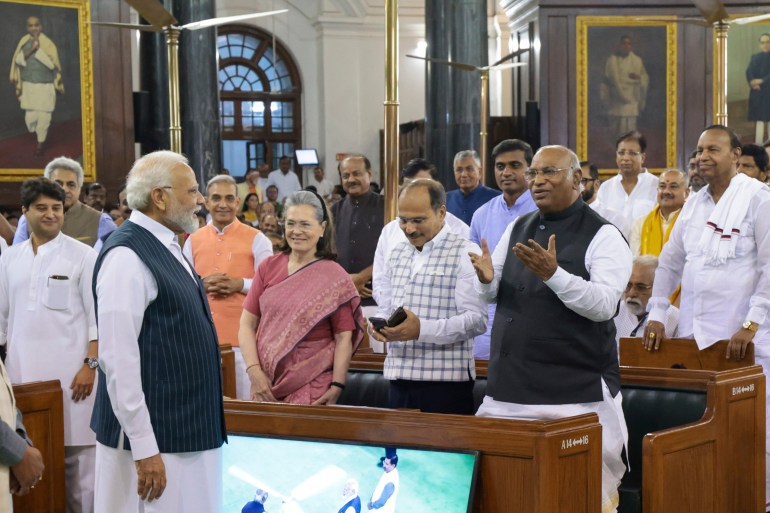Modi inaugurated the new parliament in May amid boycott by opposition which wanted India’s president to inaugurate instead.
In May, Modi inaugurated the new building, part of an ambitious redevelopment of the so-called Central Vista complex in New Delhi, amid protests from opposition parties who had wanted India’s president to inaugurate instead.
The new, bigger four-storey building can seat 1,272 members – almost 500 more than the previous one.

“It is a very emotional moment to bid farewell to the old parliament building … Its glory also belongs to us,” Modi said, addressing the lower house of the parliament in the old building on Monday.
Built by British architects Edwin Lutyens and Herbert Baker two decades before India’s 1947 independence, the old building witnessed the tortuous birth of the republic and thereafter served as a custodian of the world’s most populous democracy.
Now it is to become a museum, its 788 members moving to a new, triangular-shaped complex built at an estimated cost of $120m.
It is part of a $2.8bn revamp of British-era offices and residences in central New Delhi that will also include blocks of buildings for government ministries and departments and the prime minister’s new residence. The entire project is spread over 3.2km (1.9 miles).

Major opposition parties in May boycotted the inauguration of the new building, calling it extravagant, in a rare show of unity against Modi’s Hindu nationalist governing party, which has been ruling for nine years and is seeking a third term in next year’s elections.
“Today is an occasion to recollect and reminisce the parliamentary journey of 75 years of India before the proceedings are shifted to the newly inaugurated building,” Modi told a special session of parliament before Tuesday’s move.
His speech marked the start of a five-day special session called by the government, but there was no immediate confirmation on bills up for discussion. Indian lawmakers usually meet thrice a year: for a budget session, a monsoon session and a winter session.
The announcement of the five-day special session last month was criticised by the opposition lawmakers, who said the Modi government had not made its parliamentary agenda public and accused it of “undermining” democracy by passing crucial laws without much debate or discussion.
Last week, the government released a “tentative list” that mentioned four bills, including a controversial measure that is expected to change how India’s chief election commissioner is appointed.
